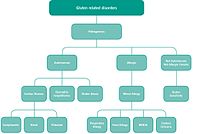Gluten-related disorders

Okay kiddo, so first we need to know what gluten is. Gluten is a type of protein found in some foods like wheat, barley, and rye. It makes breads and other baked goods elastic and helps them hold their shape.
Now, sometimes people have a hard time digesting gluten. This can cause different kinds of problems, which we call gluten-related disorders.
The three main types of gluten-related disorders are:
1. Celiac disease: This is a condition where your body can't properly digest gluten. When people with celiac disease eat foods with gluten, their bodies produce an immune response that attacks the lining of the small intestine. This makes it hard for the body to absorb nutrients from food. People with celiac disease may have symptoms like stomach pain, bloating, diarrhea, and fatigue.
2. Non-celiac gluten sensitivity: Some people have symptoms similar to celiac disease, but they don't have the same immune response. We call this non-celiac gluten sensitivity. People with this condition may have symptoms like stomach pain, bloating, and diarrhea when they eat foods with gluten.
3. Wheat allergy: This is another kind of immune response to gluten. When someone with a wheat allergy eats foods with gluten, their body produces an allergic reaction. This can cause symptoms like hives, swelling, and difficulty breathing.
The only way to treat gluten-related disorders is to avoid gluten altogether. This means not eating foods like bread, pasta, and baked goods that contain wheat, barley, or rye. Some people may also need to avoid other foods that contain gluten or cross-contamination with gluten.
It's important to talk to your doctor if you think you might have a gluten-related disorder. They can help you figure out the best way to manage your symptoms and stay healthy.
Now, sometimes people have a hard time digesting gluten. This can cause different kinds of problems, which we call gluten-related disorders.
The three main types of gluten-related disorders are:
1. Celiac disease: This is a condition where your body can't properly digest gluten. When people with celiac disease eat foods with gluten, their bodies produce an immune response that attacks the lining of the small intestine. This makes it hard for the body to absorb nutrients from food. People with celiac disease may have symptoms like stomach pain, bloating, diarrhea, and fatigue.
2. Non-celiac gluten sensitivity: Some people have symptoms similar to celiac disease, but they don't have the same immune response. We call this non-celiac gluten sensitivity. People with this condition may have symptoms like stomach pain, bloating, and diarrhea when they eat foods with gluten.
3. Wheat allergy: This is another kind of immune response to gluten. When someone with a wheat allergy eats foods with gluten, their body produces an allergic reaction. This can cause symptoms like hives, swelling, and difficulty breathing.
The only way to treat gluten-related disorders is to avoid gluten altogether. This means not eating foods like bread, pasta, and baked goods that contain wheat, barley, or rye. Some people may also need to avoid other foods that contain gluten or cross-contamination with gluten.
It's important to talk to your doctor if you think you might have a gluten-related disorder. They can help you figure out the best way to manage your symptoms and stay healthy.
